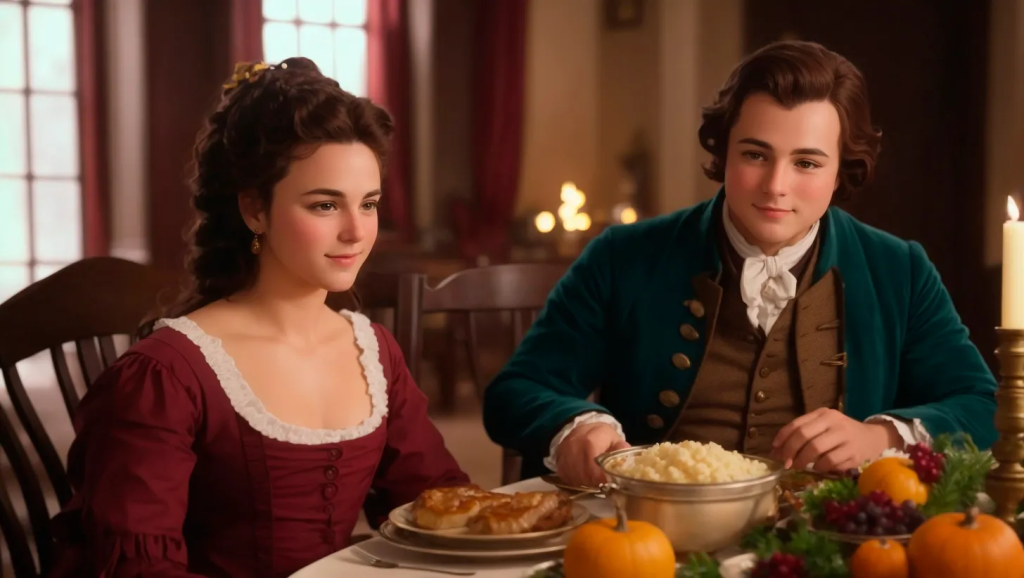Conflict over politics among families and friends at Thanksgiving dinner is nothing new. In fact, one of America’s most well-known founding families discussed politics at Thanksgiving dinner in 1765. Enjoy this story about John and Abigail Adams. He was a descendent of two Mayflower pilgrims.
In case you missed it: Fleeing anti-semitism and the first published Jewish Thanksgiving prayer in America.

The Stamp Act of 1765 was the first time that King George III and Parliament tried to impose an internal tax on all of the American colonies by requiring them to buy stamps for most paper transactions. Many, but not all, of the people believed that Parliament lacked the authority to tax them because America was not represented by a member of Parliament.
The Stamp Act caused conflict at Thanksgiving dinner tables in Massachusetts in 1765 and it also led to Thanksgiving in July.
In December 1765, John and Abigail Adams were newlyweds. He was 30 and she was 21. For Thanksgiving, they dined at her father’s house, William Smith, who was a minister. Preaching twice a month, Reverend Smith alternated the same pulpit with Reverend Ebenezer Gay.
“Went to Weymouth with my wife. Dined at Father Smith’s. Heard much of the uneasiness among the people of Hingham, at a sermon preached by Mr. Gay, on the Day of Thanksgiving, from a text in James,”[i] John Adams recorded in his diary on December 28, 1765.
Strongly advocating submission to the Stamp Act, Reverend Gay believed the weapons of the church were prayers and tears, not protests.
“We have tried prayers and tears, and humble begging and timid tame submission as long as trying is good—and instead of redress we have only increased our burdens and aggravated our condemnation,”[ii] Adams wrote in his diary as a retort to Reverend Gay’s opinion.
Reverend Smith, John and Abigail concluded at that Thanksgiving dinner that “Mr. Gay would do very well for a (stamp) distributor, and they believed he had the stamps in his house.”[iii]
In contrast, Reverend Smith had recently preached a different sermon, which the people had “admired very much, and talk of printing as the best sermon, they ever heard him preach.”[iv]
While Smith called for his people to “render therefore to Caesar, the things that are Caesars and unto God the things that are God’s,”[v] he supported civil objection.
“The tenor of it was to recommend honor, reward, and obedience to good rulers; and a spirited opposition to bad ones, interspersed with a good deal of animated declamation upon liberty and the times.”[vi] Adams observed.
A half a year later in July 1766, John and Abigail Adams celebrating Thanksgiving again. Why?
“We talked of keeping Thanksgiving with you,”[i] Abigail wrote on July 15, 1766, to her sister Mary Cranch in Salem, Massachusetts. After word arrived that the king and Parliament had repealed the Stamp Act, the colonists set aside a day to give thanks.
“Thanksgiving for the repeal of the Stamp-Act. Mr. Smith’s text was ‘The Lord reigneth, let the Earth rejoice, and the multitude of the isles be glad thereof,”[ii] John Adams wrote in his diary on July 24, 1766, about his father-in-law’s message from the pulpit for the special day of thanks for the Stamp Act’s repeal.
Adams also heard another minister’s repeal of the Stamp Act Thanksgiving message, which compared the American people to Joseph in the Bible and the king, House of Lords and House of Commons to Joseph’s brothers, who sold him into slavery.
“But as for you, ye thought evil against me; but God meant it unto good, to bring to pass, as it is this day, to save much people alive,”[iii] Adams wrote, paraphrasing Genesis 50:20 (KJV) and pointing out Joseph’s perspective and reflection on how God had turned his personal hardship into the public salvation of his people, the Israelites.

For John Adams, Thanksgiving was not just a Massachusetts tradition, but it was also a family tradition. Adams was the descendent of two Mayflower pilgrims, John and Priscilla Alden. Priscilla was one of only five Mayflower women who survived the winter of 1620-21. Their fellow pilgrim Edward Winslow wrote a letter about that first Thanksgiving in 1621.
“Our harvest being gotten in, our governor sent four men on fowling, that so we might after a special manner rejoice together after we had gathered the fruit of our labors.
They four in one day killed as much fowl as, with a little help beside, served the company almost a week. At which time, among other recreations, we exercised our arms, many of the Indians coming amongst us, and among the rest their greatest king Massasoit, with some ninety men, whom for three days we entertained and feasted, and they went out and killed five deer, which they brought to the plantation and bestowed upon our governor, and upon the captain, and others.
And although it be not always so plentiful as it was at this time with us, yet by the goodness of God, we are so far from want that we often wish you partakers of our plenty,” Edward Winslow, 1621.
Thanksgiving in July
[i] Abigail Adams, Letter to Mary Smith Cranch, July 15, 1766, Founders Online, accessed Feb. 2, 2022, https://founders.archives.gov/documents/Adams/04-01-02-0043.
[ii] John Adams, Diary, July 24, 1766, Founders Online, accessed Feb. 2, 2022, https://founders.archives.gov/documents/Adams/01-01-02-0010-0006-0002.
[iii] Ibid.
[i] John Adams, Diary, Dec. 28, 1765, Founders Online, accessed Feb. 2, 2022, https://founders.archives.gov/documents/Adams/01-01-02-0009-0005-0011.
[ii] Ibid.
[iii] Ibid
[iv] Ibid.
[v] Ibid.
[vi] Ibid.